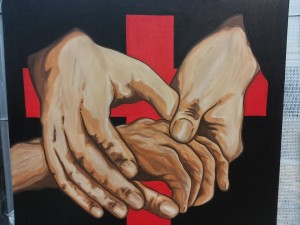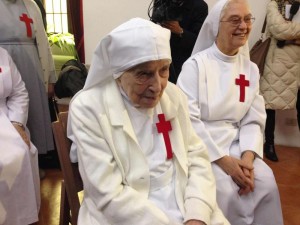Looking forward to the feast day of St. Camillus (14 July), Fr. Leocir Pessini, the Superior General of the Order of Camillians, has addressed a pastoral letter to all the members of the Institute, and in particular to our elderly and sick religious brothers:
‘Growing old with dignity and elegance: an ethical imperative and also a personal choice!
This is a letter which in its fundamental intentions wishes to be of a ‘pastoral’ character and it is hoped that it can be the subject of individual reading by religious but also of analysis and dialogue at a community level, above all in communities where we are more involved in providing direct assistance to our elderly and sick religious brothers.
The text is rather broad, above all in the first part which is concerned with offering a complete picture of the demographic development of modern society which is ‘ageing’ very rapidly. This aspect may not perhaps be of immediate interest and as such one can by-pass it and go on to the suggestions that most concern us as religious, having, as we do, to train ourselves to grow old with ‘dignity and elegance’.
DOWNLOAD THE FULL TEXT Italiano, Spagnolo, Portoghese
LETTER OF THE SUPERIOR GENERAL
Liturgical Memorial of St. Camillus
1614 – 14 July – 2015
401 years after his death
To our elderly and sick religious brothers
Growing old with dignity and elegance: an ethical imperative and a personal choice!
 During the course of my fraternal visits to various areas of Camillian geography in the world during this first year of service of mine to the religious brothers of our beloved Order, taking seriously the invitation of our pastor, Pope Francis, to move out of ourselves (personal exodus) to meet our brothers and sisters, above all those who survive in the existential outskirts of life, I have had the opportunity of meeting very many elderly and sick religious of our Order.
During the course of my fraternal visits to various areas of Camillian geography in the world during this first year of service of mine to the religious brothers of our beloved Order, taking seriously the invitation of our pastor, Pope Francis, to move out of ourselves (personal exodus) to meet our brothers and sisters, above all those who survive in the existential outskirts of life, I have had the opportunity of meeting very many elderly and sick religious of our Order.
I came across the cries of many which touched my heart, cries at times of people in difficulty and/or at times that were silent, expressed with tears in their eyes, with sad and beseeching eyes: ‘do not forget about us, come back to see us again’; ‘take care of our Order with affection, please!’ I was reminded of some religious brothers of ours whom a Superior General of the Order (1977-1989), Fr. Calisto Vendrame – who was my spiritual director and teacher for various years during my period of formation in San Paolo, Brazil, remembered when writing a very fine ‘Letter to the Elderly’. This message was inscribed in the hearts of an entire generation of young and adult Camillians at that time, many of whom are elderly today. I imagine that it also had an important effect in strengthening the self-esteem of elderly Camillians who today are probably in the house of the Father.
We remember with nostalgia this beloved religious brother of ours when re-reading this text which was published in our CCI (Centre of Camillian Information) bulletin in the column dedicated to ‘The Word of the Superior General’. The prophetic vision of his message is of surprising contemporary relevance, and this in terms of Christian ethical values, belonging to historical, sociological and socio-political times that were so different from today…and a little more than thirty-three years have passed (cf. CIC, n. 147, year XII, 20 April 1982, pp. 157-158). Our human condition is such that when we are elderly or sick we are touched in a deeper way in our frailty and vulnerability, to the point of becoming ‘high-sensitivity radar’.
In the special year that the Catholic Church has dedicated to consecrated life we are invited to ‘look to the past with gratitude, to live the present with passion, and to serve with Samaritan compassion and embrace the future with hope’. This letter, in reality, emerged as an analysis from an ethical-pastoral point of view of the reality of overall human ageing (NB: the first point can even be ignored by those who are not interested in a scientific-academic knowledge of the context and the reality of the problem under examination) and requires a little time, patience and dedication for a thoughtful reading. In drawing up this message to my elderly and sick religious brothers I express my gratitude to those who have constructed this heroic Camillian history, which has lasted for more than four centuries, for the many exhortations that they have offered me.
Differently from Asian culture where elderly people are still seen as being culturally relevant and socially respected as the memory and the embodied wisdom of the community (cf. in Japan the day dedicated to the elderly is celebrated as a national holiday), in our western culture the elderly are not seen in such terms. The emphasis is increasingly placed on their disabilities and limitations, on the costs and expenditure that are needed for their care at the level of health-care policies, and on the deterioration of the system of pensions. Increasingly less emphasis is placed on their rich life histories, on the experience and human wisdom of which they are the custodians. At the basis of this reductive vision of the human person, who is defined solely for what he or she ‘produces and not for what he or she is’, a great question is located: ageing constitutes a stage in life that is characterised by an existential crisis that has three dimensions: an identity crisis (with self-loss); a crisis of autonomy (with an increasing dependence on others); and a crisis of belonging (an uprooting from his or her environment and a move towards an old people’s home). We need to retrieve, through a resilient approach, the meaning of this crisis that deeply afflicts elderly people, above all in our society, which is by now defined as a throwaway civilisation and one with programmed expiry dates! How Pope Francis insists: “There was much progress in medicine and in social assistance, but was also spread out a throwaway culture, as a consequence of the anthropological crises that has no more the human being at its centre, but the consumerism and the economic interests (cf. Apostolic Exhortation Evangelli Gaudium, 52-53). Among the victims of this throwaway culture, I would like to remember in particular the elderly, (…), the elderly that are the memory and the wisdom of the humanking. Their long life is not always saw as a gift from God, but sometimes as a heavy burden to carry, mainly when the health is deeply weak. This mentality does not any kind of good to society, and it is our duty to develop some “vaccine” against this way of consider the elderly, or people with disabilities, as if their lives would be lives not worthy of being lived. This is a sin, is a grave social sin (…). We need to learn a different vision about life and the human person!” (Pope Francis, Torino 21/06/2015. Meeting with the sick and people with disability at the Cottolengo´s Church)
Until not so long ago, the scientific literature only mentioned old age. Today the scientific literature on ageing detects three categories of elderly people: a) young elderly people between the ages of 65 and 75; b) elderly people in the true sense of the term between the ages of 75 and 85: v) very elderly people, those who are over the age of 85, who in the hear future, according to researchers in this field, will increasingly grow in numbers! At the time of St. Camillus people spoke a great deal about the poor and the sick, whereas the category of elderly people was almost never mentioned in his writings! Certainly there were elderly people during that epoch. Today, however, together with the poor and the sick we also have the great task of looking after the elderly who need special care and concern, above all if they have chronic degenerative diseases such as Alzheimer’s and Parkinson’s. The ageing of the population is a very recent phenomenon in human history. In developed countries the number of paediatric hospitals has decreased in a significant way and in many cases they have even disappeared, but in the other direction nursing homes and/or old people’s homes have multiplied, becoming a real form of remunerative business within the panorama of the world of health and health care.
Today we are living to the full the glamour epoch of ‘post-everything’ in many aspects of human life. We live in a society that is called ‘post-modern’, reference is made to ‘post-industrial’, ‘post-Christian’ and even ´post-death ‘and ‘post-human’ civilisation! Yes! ‘Post-humanism’ is an ideological movement which in proclaiming the banishing of death from the life of man – which is seen together with ageing as an illness to which a remedy must be found and not as a dimension of our existence – offers us the ‘gift of immortality’ on earth. In addition to sophisticated pseudo-scientific techniques, promises for the near future, we are almost able to stop the biological clock of human ageing and then, indeed, we could live eternal youth (bio-gerontology).
Humanity has still not managed to uphold and apply the fundamental rights of man which were proclaimed by the United Nations in 1948 at the end of the Second World War (1939-1945) and which guarantee the possibility of living with dignity (freedom of thought and of conscience, education, health, housing, work, etc.). And now we are already involved in this anthropological vision according to which a human being is something that has to be gone beyond and superseded. Naturally enough, we have before us an ideology which, just as it has tried to deny our finitude, is now also trying to deny our human condition. Age cannot be seen as a pathological process or worse as a tragic destiny upon which we cannot intervene except through passive acceptance!
We have to discover how it is possible to grow old with grace, wisdom, serenity and aesthetic elegance. This is the horizon of the analysis that I offer in this message, whose contents in large measure are organised into three parts: 1) some ethical reflections on statistical data about the reality of human ageing in the contemporary world and the challenges that are posed in terms of public policies and health care; 2) the challenge to become protagonists in the art of living with dignity and to be joyful about the ‘Sunday of our lives’; 3) some suggestions to young people and elderly people remembering with gratitude Fr. Calisto for the legacy of tenderness which he left in the hearts of many religious brothers of ours.















Camillians on Facebook
Camillians on Twitter
Camillians on Instagram